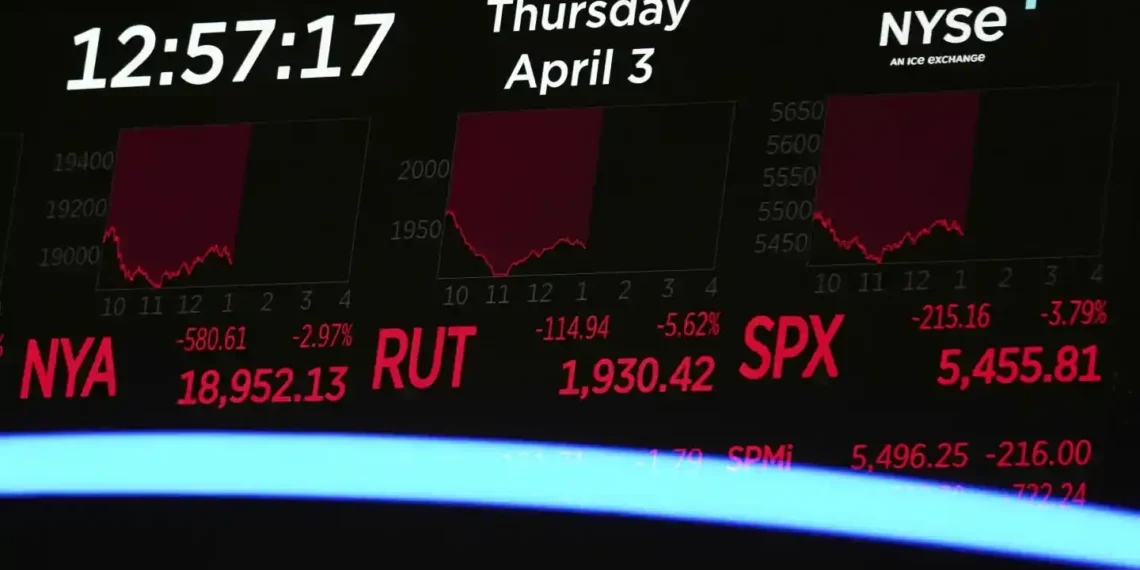Think Twice Before Bailing on the Stock Market, Experts Advise
NEW YORK – Wall Street’s volatility has been hard to ignore, leaving many investors wondering whether it’s time to pull out of the stock market. While the sharp market swings may seem unsettling, experts argue that such drops are a regular part of investing and often come with the territory of chasing long-term growth. Here’s what you need to know about the current market and why financial advisers are urging investors to think twice before making any rash decisions.
Is the Market in Trouble?
The S&P 500, Wall Street’s main benchmark, has dropped over 16% since hitting an all-time high on February 19, largely driven by concerns over President Donald Trump’s tariffs. While uncertainty around the economy can give investors pause, the trade war has particularly rattled confidence, making it harder for businesses and households to plan long-term.
Trump’s unexpected tariffs on “Liberation Day” sent shockwaves through the market, leading to the worst day since the COVID-19 crash of 2020. Investors had hoped the tariffs were a negotiation tactic, but as fears mount, the possibility of prolonged tariffs has become a bigger concern for markets.
Is This Unusual?
Not really. Significant drops like this aren’t as rare as they seem. Historically, the S&P 500 has seen declines of at least 10% every year or so. While they’re unsettling, these declines are often a healthy reset for the market, weeding out overblown optimism that can drive prices too high.
Before this latest dip, some experts were already warning that the U.S. stock market had become overpriced. The rise in stock prices had outpaced corporate earnings, and a handful of big-tech companies were driving most of the market’s returns.
Should I Sell Everything Now?
It’s tempting to sell off investments when the market is down, especially if you’re feeling the sting of losses. But selling locks in those losses, preventing the chance for recovery. Historically, the S&P 500 has rebounded after every downturn — from the Great Depression to the dot-com bust and even the 2020 crash.
That said, experts suggest you should only invest money you won’t need for the next five to 10 years. Short-term emergency funds or savings for upcoming expenses should not be tied up in the market.
“No one can consistently time the market,” said Odysseas Papadimitriou, CEO of WalletHub. “Trying to sell at the right moment often leads to missed opportunities.”
Should I Reassess My Investments?
After years of market dominance, especially by Big Tech, many investors are reconsidering their strategies. But this downturn is a reminder that diversification is key. A well-balanced portfolio that includes a mix of asset types and sectors can help reduce risk when volatility strikes.
“It’s tough when it feels like your portfolio is getting hammered,” said Brian Jacobsen, chief economist at Annex Wealth Management. “But sticking to a diversified approach can help cushion the blows.”
Phil Battin, CEO of Ambassador Wealth Management, recommends diversifying across regions and sectors to better weather storms. He suggests focusing on resilient sectors like consumer staples, utilities, and healthcare — industries that are less dependent on international trade.
I’m New to Investing. What Should I Do?
For younger investors, the good news is that you have time on your side. With decades to go before retirement, you can afford to ride out the market’s ups and downs and allow your portfolio to recover over time.
Financial analyst Stephen Kates advises new investors to avoid making emotional decisions during turbulent times. “Stick to your long-term goals,” Kates says. “The market has been volatile in the past, but patience has paid off for investors who held steady.”
What About Those Nearing Retirement?
For those nearing retirement, the situation is trickier. With less time to recover losses, older investors may need to adjust their spending and withdrawal plans after sharp market declines. But even retirees may still need some stock exposure to ensure their investments last through retirement.
Niladri “Neel” Mukherjee, chief investment officer at TIAA Wealth Management, suggests retirees consider slowing their withdrawals temporarily. “You might want to cut back on spending and withdrawals during downturns,” he says. “But always discuss adjustments with your adviser.”
How Long Will This Last?
No one knows for sure how long the current volatility will last. The important thing is not to make drastic moves in response to short-term fluctuations. As history has shown, the market has a way of recovering over time. Patience and a solid strategy are your best bet.
The stock market can be unpredictable, but pulling out in fear of short-term drops could cost you in the long run. Keep a cool head, stay diversified, and stick to your long-term goals — those are the best strategies for navigating uncertain times.
This article was rewritten by JournosNews.com based on verified reporting from trusted sources. The content has been independently reviewed, fact-checked, and edited for accuracy, neutrality, tone, and global readability in accordance with Google News and AdSense standards.
All opinions, quotes, or statements from contributors, experts, or sourced organizations do not necessarily reflect the views of JournosNews.com. JournosNews.com maintains full editorial independence from any external funders, sponsors, or organizations.
Stay informed with JournosNews.com — your trusted source for verified global reporting and in-depth analysis. Follow us on Google News, BlueSky, and X for real-time updates.














